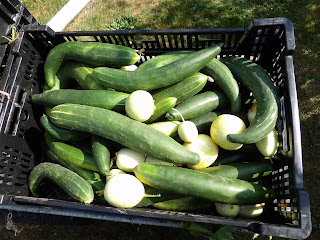Hello Moon Bears,
Summer is nearly at its peak now. The garden is transitioning into hot weather produce, like tomatoes, tomatillos, peppers and corn. The potatoes are also ripening. Check out the interior view of the
All Blue Variety above. Mid Summer also brings its share challenging critters. Which leads an organic farmer into all sorts of quandaries. Consider the meadow vole. This is a small mouse-like rodent that lives in meadows and gardens. It is bigger than a mouse and it's abundant. In our area the vole can comprise up to 80% of the mammal life.
Wikipedia Meadow_Vole
 |
| The Culprit |
In our garden the vole is pest #1. In fact I have a difficult time not hating this creature. Yet, it has a right to live and thrive in our world. But where does a micro-farmer draw the line between rights and excesses? Or is it just a matter of surrender? This week, 70% of our beet crop has been chewed or hollowed out by these hidden creatures. This leaves one with some hard questions if one is to remain faithful to organic and compassionate beliefs.
The average farmer would poison the critters. But the poisonous rebound effect on predators such as owls and coyotes is devastating. Also, the neighbor's cats are at risk of death if they eat a poisoned vole. Some folks have suggested cats in the garden to patrol. But think about what cats do in well tilled succulent dirt. They leave deposits which have potentially dangerous pathogens to our customers. So cats are out.... They just patrol the perimeter of the garden. The natural predators are being killed by the locals who fear for their little dogs which run wild. So they are not in the picture either. Organic repellants are touted to be effective, hot pepper spray, something called Plantskydd
, predator urine etc. But none of these have worked here. And trapping thousands of these creatures is out of the question.
 |
| After a Vole Attack |
Look at the damage they cause the beets. And when the beets are pulled up they will move to the carrots and the potatoes. Our strategies have been mostly to plant A LOT of roots vegetables and hope we have enough. They take an average of 25% of our entire root crops. That's a chunk. And a disappointment every single year. Every organic farmer has a nemesis or two. The regular world just poisons what ails them. Which ironically allows the same poison to enter the human food chain. And that's worse than crop damage.
When you see organics being a higher price remember, this set of issues is one of the reasons. It can be hard to remain with integrity when faced with such predation on the plants and profits. Yet our customers and earth deserve only the best the earth's farmer has to offer.
 On You Full Share Menu this Week:
On You Full Share Menu this Week:
- Summer Salad Mix
- Swiss Chard
- All Blue and the Best Russet Potatoes Ever
- Fresh Garlic
- Beira Kale Also called Sea Kale. Great for Smoothies
- Siberian Kale
- Russian Kale
- Golden and Ruby Beets (What's left)
- Red and White Onions
- Armenian Striped Cucumbers
- Sprouting Broccoli
Also, we are making another organic choice. We will begin transitioning to non petroleum based produce bags in the next couple of weeks. There's some fair amount of misinformation out there about "Bio-degradable" bags. Some supposed biodegradable bags are only petroleum based bags with unproven chemicals put in to "speed" degradation... which can still take 500 years.
Last year we did an experiment with one of the potato chip bags that claimed to biodegrade within 90 days. We put the bag in our compost pile for a Year. Everything in the pile was composted Except the bag. It was still whole and even had all the lettering on it, like new. So buyer beware of eco-friendly claims. Here's a resource for info.: do-biodegradable-plastics-really-work
With that being said, we are buying into the corn based bags. The cost will be four times what a regular bag would cost. That's a small price for integrity. Here's info on the new bags: Bio Bag.
Thanks,
Rick
(c) Copyright Moon Bear Produce, Rick Sievers, July 2015


 Hello Moon Bears,
Hello Moon Bears,















